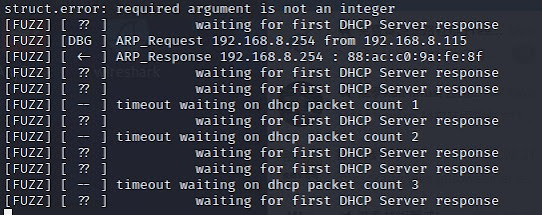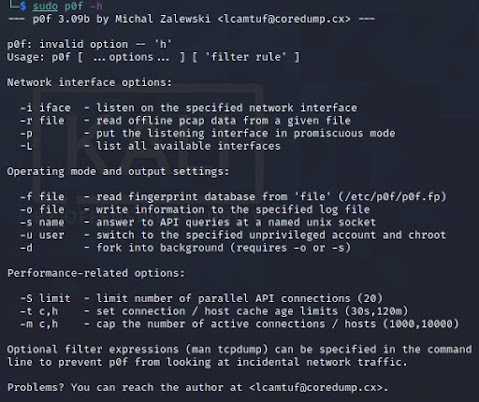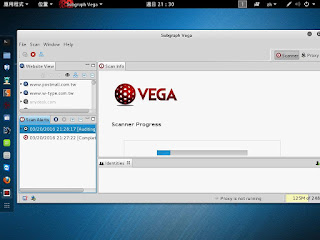DNSchef(封包擷取或假造資料)
dnschef~封包擷取或假造資料
DNSChef is a highly configurable DNS Proxy for Penetration Testers and
Malware Analysts. It is capable of fine configuration of which DNS replies
to modify or to simply proxy with real responses. In order to take
advantage of the tool you must either manually configure or poison DNS
server entry to point to DNSChef. The tool requires root privileges to run
on privileged ports.
sudo dnschef -h
usage: dnschef [options]:
_ _
| | version 0.4 | | / _|
| |_ ___ ___| | ___| |_
/ _` | '_ \/ |/ | '_ \ / _ \ _|
| (_| | | | \__ \ (| | | | / |
\__,_|_| |_|___/\___|_| |_|\___|_|
iphelix@thesprawl.org
DNSChef is a highly configurable DNS Proxy for Penetration Testers and
Malware Analysts. It is capable of fine configuration of which DNS replies
to modify or to simply proxy with real responses. In order to take
advantage of the tool you must either manually configure or poison DNS
server entry to point to DNSChef. The tool requires root privileges to run
on privileged ports.
optional arguments:
-h, --help show this help message and exit
--fakedomains thesprawl.org,google.com
A comma separated list of domain names which will
be resolved to FAKE values specified in the the
above parameters. All other domain names will be
resolved to their true values.
--truedomains thesprawl.org,google.com
A comma separated list of domain names which will
be resolved to their TRUE values. All other domain
names will be resolved to fake values specified in
the above parameters.
Fake DNS records::
--fakeip 192.0.2.1 IP address to use for matching DNS queries. If you
use this parameter without specifying domain
names, then all 'A' queries will be spoofed.
Consider using --file argument if you need to
define more than one IP address.
--fakeipv6 2001:db8::1
IPv6 address to use for matching DNS queries. If
you use this parameter without specifying domain
names, then all 'AAAA' queries will be spoofed.
Consider using --file argument if you need to
define more than one IPv6 address.
--fakemail mail.fake.com
MX name to use for matching DNS queries. If you
use this parameter without specifying domain
names, then all 'MX' queries will be spoofed.
Consider using --file argument if you need to
define more than one MX record.
--fakealias www.fake.com
CNAME name to use for matching DNS queries. If you
use this parameter without specifying domain
names, then all 'CNAME' queries will be spoofed.
Consider using --file argument if you need to
define more than one CNAME record.
--fakens ns.fake.com NS name to use for matching DNS queries. If you
use this parameter without specifying domain
names, then all 'NS' queries will be spoofed.
Consider using --file argument if you need to
define more than one NS record.
--file FILE Specify a file containing a list of DOMAIN=IP
pairs (one pair per line) used for DNS responses.
For example: google.com=1.1.1.1 will force all
queries to 'google.com' to be resolved to
'1.1.1.1'. IPv6 addresses will be automatically
detected. You can be even more specific by
combining --file with other arguments. However,
data obtained from the file will take precedence
over others.
Optional runtime parameters.:
--logfile FILE Specify a log file to record all activity
--nameservers 8.8.8.8#53 or 4.2.2.1#53#tcp or 2001:4860:4860::8888
A comma separated list of alternative DNS servers
to use with proxied requests. Nameservers can have
either IP or IP#PORT format. A randomly selected
server from the list will be used for proxy
requests when provided with multiple servers. By
default, the tool uses Google's public DNS server
8.8.8.8 when running in IPv4 mode and
2001:4860:4860::8888 when running in IPv6 mode.
-i 127.0.0.1 or ::1, --interface 127.0.0.1 or ::1
Define an interface to use for the DNS listener.
By default, the tool uses 127.0.0.1 for IPv4 mode
and ::1 for IPv6 mode.
-t, --tcp Use TCP DNS proxy instead of the default UDP.
-6, --ipv6 Run in IPv6 mode.
-p 53, --port 53 Port number to listen for DNS requests.
-q, --quiet Don't show headers.





留言
張貼留言